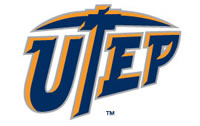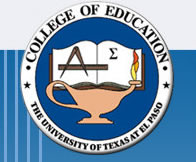
Bill Robertson, Ph.D. - Classes
Teacher Education Department
ECED/BED 4311 - Teaching Science in Primary Grades - Syllabus
It’s what you learn after you know it all that counts. - John Wooden
Instructor: Dr. Bill Robertson
Phone: 747-8608
Office: Education Building, Room 606
Email: robertson@utep.edu
Web Site: http://utminers.utep.edu/robertson
Office hours: Monday 1:30 - 3:00 PM, Wednesday 1:30 - 3:00 PM
Texts
Richard Howell Allen (2001). Impact Teaching: Ideas and Strategies for Teachers to Maximize Student Learning, Allyn & Bacon.
Rutherford, F. James and Algrehn, Andrew (1990). Science For All Americans, New York, Oxford University Press.
Course Description
This course will explore the methods and materials needed for teaching science in fourth through eighth grade. The emphasis of the class will be placed upon inquiry and standards-based teaching and learning. This includes the utilization of computer applications and field experiences.
Goals
This course is designed to help you examine critically the perspectives, philosophies, materials, and strategies for effective learning in middle school science classrooms. The ultimate goal is to understand how to design a learning climate where every student is held to high expectations and achieves maximum learning. In particular, the participants will develop a better understanding of effective science teaching and learning in schools in the unique border schools so our community will be equipped to make informed decisions about our world, to pursue science fields, to critically examine the power of science in our society, and to participate in improving our society.
Meeting Times
Classes will be on Wednesdays from 10:30 AM to 1:20 PM during the fall 2005 semester. Homework will be assigned regularly. The class will be a combination of lecture, guided instruction, classroom discussion, classroom exercises, and project development. Every class meeting is vital. It is the students’ responsibility to meet with the professor to arrange an alternative for any class session missed. Cell phones and other forms of electronic communication should be turned off during class meetings.
TExES Standards
You will be practicing teaching using a constructivist curriculum designed to provide successful learning experiences for all the children. Through this actual classroom teaching experience, you will be practicing concepts from Standards I, II, and III on the Pedagogy and Professional Responsibilities Standards (PPR) with particular emphasis on planning and designing instruction, instructional strategies, informal and formal assessment, and managing the classroom environment. The class is also designed to address the following science standards from the 4-8 Comprehensive Standards:
- Standard I: The science teacher manages classroom field, and laboratory activities to ensure the safety of all students and the ethical care and treatment of organisms and specimens.
- Standard III: The science teacher understands the process of scientific inquiry and its role in science instruction.
- Standard IV: The science teacher has theoretical and practical knowledge about teaching science and about how students learn.
- Standard V: The science teacher knows the varied and appropriate assessments and assessment practices to monitor science learning.
Objectives
- Demonstrate the following components vital to quality science education:
- Ability to implement an inquiry-based science curriculum
- Ability to assist students in designing investigations using scientific inquiry
- Understanding of the binational and bilingual implications in El Paso area science education
- Understanding of the role of women and underrepresented groups in science decisions and science careers
- Exhibit professionalism as a teacher of science
- Understanding of local resources and quality curriculum materials to assist your science program
- Improvement in your personal understanding of science concepts
- Understanding of standards for excellence (National Science Education Standards, TEKS, Excellence in Environmental Education -- Guidelines for Learning)
Course Requirements
Written Responses (25% of course grade): Reflective essays and journaling documents your reflective thinking and learning. These must be submitted within the week of the assigned question prior to the following class meeting.
Class Participation and Attendance (25% of course grade): It is expected that all students will be actively engaged in class discussion and activities and will exhibit a professional demeanor as described in Professional Responsibility from the Code of Ethics for Texas Educators. Successful completion of the course depends on fifteen quality interactive learning experiences. Therefore, when you must be absent, you must contact the professor to design alternative learning experiences.
Written and oral reports: Presentation and analysis of a series of integrated, constructivist lessons (40% of course grade): You will develop and implement a series of quality science lessons and the in-depth analysis of those lessons. Written work is expected to be submitted on the due date assigned and in proper written format. This will also include both your midterm and final projects.
Two-three page summary and reflection: Community Outreach Activity (10% of grade): Following Epstein’s Model of Parent Involvement, students will participate in and provide a reflection paper on a community outreach activity. This activity can focus on any of the following areas: parenting, communicating, volunteering, learning at home, decision making and collaborating within the community.
Grading Evaluations
A: 90% - 100%, B: 80% - 89%, C: 70%-79%, D: 60%-69%, F: <60%
Academic Dishonesty
Academic dishonesty is prohibited and is considered a violation of the UTEP Handbook of Operating Procedures. It includes, but is not limited to, cheating, plagiarism, and collusion. Cheating may involve copying from or providing information to another student, possessing unauthorized materials during a test, or falsifying research data on laboratory reports. Plagiarism occurs when someone intentionally or knowingly represents the words or ideas of another person’s as ones’ own. And, collusion involves collaboration with another person to commit any academically dishonest act. Any act of academic dishonesty attempted by a UTEP student is unacceptable and will not be tolerated. Violations will be taken seriously and will be referred to the Dean of Students Office for possible disciplinary action. Students may be suspended or expelled from UTEP for such actions.
Students with Disabilities
If you have or believe you have a disability, you may wish to self-identify. You can do so by providing documentation to the Office of disabled Student Services located in Union E Room 203. Students who have been designated as disabled must reactivate their standing with the Office of Disabled Student Services on a yearly basis. Failure to report to this office will place a student on the inactive list and nullify benefits received. If you have a condition which may affect your ability to exit safely from the premises in an emergency or which may cause an emergency during class, you are encouraged to discuss this in confidence with the instructor and/or the director of Disabled Student Services. You may call 747-5148 for general information about the Americans with Disabilities Act (ADA).
![]() Download a
PDF Version of this Document (18 Kb)
Download a
PDF Version of this Document (18 Kb)
Syllabus | Schedule | Assignments | Readings | Evaluation | Links

Bill Robertson, Ph.D. (robertson@utep.edu)
Teacher Education Department, College of Education, University of Texas at El Paso